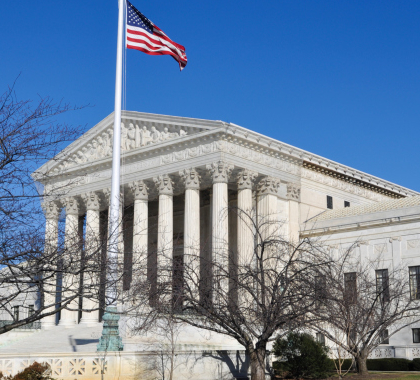A New Orleans lawyer is suing the Louisiana State Bar Association (LSBA) in federal district court, calling for an end to mandatory membership in and payments to the LSBA.
Boudreaux v. LSBA is one of several cases challenging mandatory state bar membership and dues, says Dane Ciolino, a Loyola University law professor who is representing Boudreaux.
“In Louisiana and 29 other states, those who practice law are being denied their First Amendment rights not to speak, not to associate with a group against their will, and not to pay for others’ political advocacy,” Ciolino said. “The government forces lawyers in these states to join and pay dues to bar associations just to practice their profession.”
Paying for Political Activism
Forced membership in and payment of dues to the LSBA violate an individual’s First Amendment rights to free speech and association, says Jacob Huebert, a senior attorney at the Goldwater Institute, which is assisting in Boudreaux’s case and similar suits.
“These bar associations don’t just regulate lawyers and help them act ethically,” said Huebert. “They act as advocacy groups. They might support or oppose ballot initiatives, publish articles in their periodicals promoting one side or the other of an issue, and use mandatory dues to promote certain causes.”
The LSBA openly engages in political advocacy, says Ciolino.
“Louisiana’s mandatory bar association has taken positions on a range of controversial issues, including removal of ‘free enterprise’ education from the state’s high school curriculum requirements, the death penalty, drug policy, and social issues,” Ciolino said. “Louisiana lawyers are forced to pay to promote the bar’s views even if they disagree, to continue practicing law.”
From Powerless to Overpowering
Organized labor has strayed from the original purpose of worker associations, says Daniel Erspamer, CEO of the Pelican Institute, which is assisting in Boudreaux’s case.
“Unions began as most ideas do, with good intentions in mind,” Erspamer said. “They served as a mechanism for workers to come together to collectively negotiate and ensure their rights are being protected by employers. Over time, however, unions have become exactly what they initially fought against.”
Unions gained political clout and secured legislation that favored them, says Erspamer.
“The great power they have accrued over the decades has corrupted many unions across the country, and this has led to rights violations such as those detailed in Mark Janus’ and Randy Boudreaux’s cases,” Erspamer said.
Janus Precedent
Boudreaux’s complaint cites the 2018 U.S. Supreme Court ruling in favor of Illinois government employee Mark Janus, who wanted the freedom to opt out of all union dues.
“The U.S. Supreme Court ruled in Janus v. AFSCME that the First Amendment prohibits governments from making their employees pay union fees, which inevitably fund unions’ political speech, just to keep their jobs,” Erspamer said. “Louisiana’s government is forcing lawyers to join and pay dues to the bar association to be allowed to pursue their chosen profession.”
The logic of Janus extends beyond government employees, Huebert says.
“Certainly, based on the Janus decision, it should be unconstitutional to require lawyers to join and pay a bar association,” Huebert said. “Janus said that forcing money to pay for someone else’s political advocacy is subject to rigorous First Amendment scrutiny, which mandatory bar membership and dues can’t survive.”
Political Involvement Barred
The U.S. Supreme Court directly addressed the use of mandatory bar dues in a 1990 case, Keller v. State Bar of California.
“In that case, the court essentially said that bar associations should follow the same rules as public-sector unions in using mandatory dues,” Huebert said. “The court said that bar associations could use mandatory dues for activities germane to regulating lawyers, just as unions could use mandatory fees for activities germane to collective bargaining.”
The Janus decision on public employee unions should apply to bar associations, says Huebert.
“Now the rule for public-sector unions is that people can’t be forced to pay them at all, so that should be the rule for bar associations as well,” Huebert said.
North Dakota Case Parallel
The Boudreaux case is similar to North Dakota’s Fleck v. Wetch case, says Erspamer.
“Attorney Arnold Fleck, represented by the Goldwater Institute, sued to challenge his state’s mandatory bar after he learned that it used $50,000 of members’ mandatory dues to oppose a ballot measure on child-custody reform that he’d spent his own time and money supporting,” Erspamer said.
The U.S. Court of Appeals for the Eighth Circuit court ruled against Fleck in 2017. After the Janus decision against mandatory membership in public employee unions, the U.S. Supreme Court instructed the circuit court to reconsider its decision. A three-judge panel of the circuit court found the North Dakota bar’s mandatory membership fees do not violate the First Amendment, on August 30.
“Hopefully, the North Dakota case, coming up in a petition to the Supreme Court in November, will resolve this issue for the entire country,” Huebert said.
Challenge ‘Should Prevail’
Boudreaux’s case, filed on August 1 in the U.S. District Court for the Eastern District of Louisiana in New Orleans, has not been scheduled for trial.
“I’m sure whoever loses in the trial court in this case will appeal and take it up as high as necessary,” Huebert said.
Other cases are also working their way through state and federal courts, says Erspamer.
“Boudreaux and the other lawyers challenging bar associations’ forced fees should prevail,” Erspamer said. “We hope the Supreme Court will ultimately hear one of their cases and declare that lawyers have the same First Amendment rights as everyone else.”
Ashley Bateman ([email protected]) writes from Alexandria, Virginia.




